Last Updated on October 17, 2020 by rob
Veteran cop Okumura (Tomisaburo Wakayama) finds himself on the trail of Sugiyama, who’s stolen a cache of guns from a US airbase and is on the run after shooting dead two police officers. But things get messy when the killer guns down a rival gang member whose boss Okumura is friends with, while the increasingly ruthless Seijin-kai gang, whom Sugiyama is working for, plot to seize the guns for themselves with the help of a mole in the police department.
An entertaining cop thriller with a good story, a good plot and star Wakayama showing a slightly different side to his screen persona as the tough yet avuncular copper who helps a rookie policeman named Kato find his feet and adopts (to his wife’s understandable surprise) Etsuko, the daughter of Yakuza boss Miyagawa, just so she can marry her straight arrow boyfriend without the stigma of her father’s occupation staining her reputation. What a generous man! Wakayama brings a nice self-deprecating humour to his character and I loved the scene where Okumura pleads with the father of Etsuko’s intended to allow the marriage to go ahead and actually gets quite emotional when the father-in-law unwisely suggests his motive might be less than honourable.
Wakayama’s a burly guy you do not want to mess with but when he tries to storm out in anger it’s petite wife Kayo who pulls him back down with an almighty thump and the look on his face is an absolute hoot. It’s also Okumura who enlists Etsuko’s Yakuza father Miyagawa in the search for the killer and is thus indirectly responsible for the disastrous chain of events that ends with him going down for eight years for manslaughter. When Miyagawa’s family assemble at the jail to let Dad know the marriage of Etsuko can go ahead it’s Okumura who benevolently greets everyone and even bollocks the prison guard into letting the family stay and chat with the prisoner for as long as they want! It’s a pleasure to see Wakayama so charming but once Sugiyama is ratted out to the cops by persons unknown the story gets very grim indeed.
The latter stubbornly refuses to reveal where he’s hidden the stolen guns so Okumura’s interrogation of him gets turned into an extended setpiece; a portrait of how to break a man mentally as our hero refuses to let his quarry sleep and then after three days without rest takes him into the police gym for some ‘exercise’ in a scene that’s as funny as it is brutal (and very similar to a sequence in Kinji Fukasaku’s Yakuza Graveyard made just a few years later). From this point on the film spins one engrossing plot twist after another with a spiralling body count to match. Adding to the fun is Kunihiko Murai’s fantastically funky, foot tapping score which sounds like it’s come straight out of some New York set crime thriller of the period.
The story also boasts a couple of well handled mystery elements. A payoff in a sauna between the police mole and the Seijin-kai wisely keeps the traitor’s identity concealed from us but drops a vital clue regarding an item of clothing he carries. If you’re familiar enough with the genre you could argue that the identity of the mole comes as no big surprise but at least the film makes an effort in this regard and I appreciated that. Also, a bit of business early on in which the gang’s loathsome enforcer Murakoshi attempts to bribe Okumura with a gift of his gold cigarette lighter cleverly comes into its own in the last act when Okumura spots the same lighter in the presence of Sugiyama’s girlfriend and we suddenly realise just who betrayed him to the cops and then snatched the guns under the noses of Okumura and his men.
Kenji Misumi’s smooth, confident direction emphasises reflections of people and objects so persistently it becomes a visual motif. He shoots using a long (telephoto) lens and that gives the film a distinctive look (especially a roadside hit on the prison van transporting Sugiyama), one that’s quite unlike, say, the handheld newsreel style of a Kinji Fukasaku cop thriller. In fact there are some really visually striking sequences here. A pivotal moment of truth in the Okumura/Sugiyama interrogation consisting of tight close ups of each man’s face as Okumura seems to divine Sugiyama’s innermost thoughts – even the reverse angle on Sugiyama captures his reflection in a windowpane – is a terrific image. Although the first half of the film has moments of brutality the emphasis on friendship and family proves sufficiently involving and disarming that when the real violence explodes it takes your breath away.
When Okumura, alone, unwisely confronts the gang in their corporate office the Seijin-kai’s silkily sadistic leader has his men beat our hero to a pulp, slice his face with a blade and then kick him in the balls several times for good measure. But that’s merely a foretaste of the bleakness to come as the gang’s ruthlessness means most everyone Okumura cares for ends up dead. So when our battered hero returns to their office toting a double barrelled shotgun, orders the gang to line up and then shoots Murakoshi in the face before executing the rest of the crying, screaming thugs (Misumi amusingly singles out one of them pissing his pants in terror before Okumura drills him a new hole straight between the eyes) Okumura’s rampage of revenge proves so thrillingly relentless you’re just kind of sitting there in slack-jawed amazement at what’s unfolding.
Misumi doesn’t stint on the gore either. Blood squibs for head and body shots are plentiful and the director even imports the blood geyser effect from his Lone Wolf movies (which Internal Sleuth appears to have been produced in the middle of. What’s interesting about the climax is that although we’re cheering him on there’s little sense of satisfaction or vengeance on Okumura’s part. It feels like the impersonal extermination of a bunch of rats. No surprise then that Okumura ends up thrown out of the police force and facing a murder charge from cowardly superiors who’ve spent the whole movie talking a good game about bringing down the Seijin-kai but never actually done anything about it. By contrast, Okumura nails the bad guys and gets the stolen guns back but – get this – he’s the villain! In this respect the film wholly embodies both the cynicism of the era and an implicit sympathy for the hulking Okumura, a good man out of his own time. Asked by reporters if he’ll appeal his sentence Okumura’s stoic response is entirely in character, “Appeal? I won’t do such a thing”, says our hero, “I’m a cop, after all.”
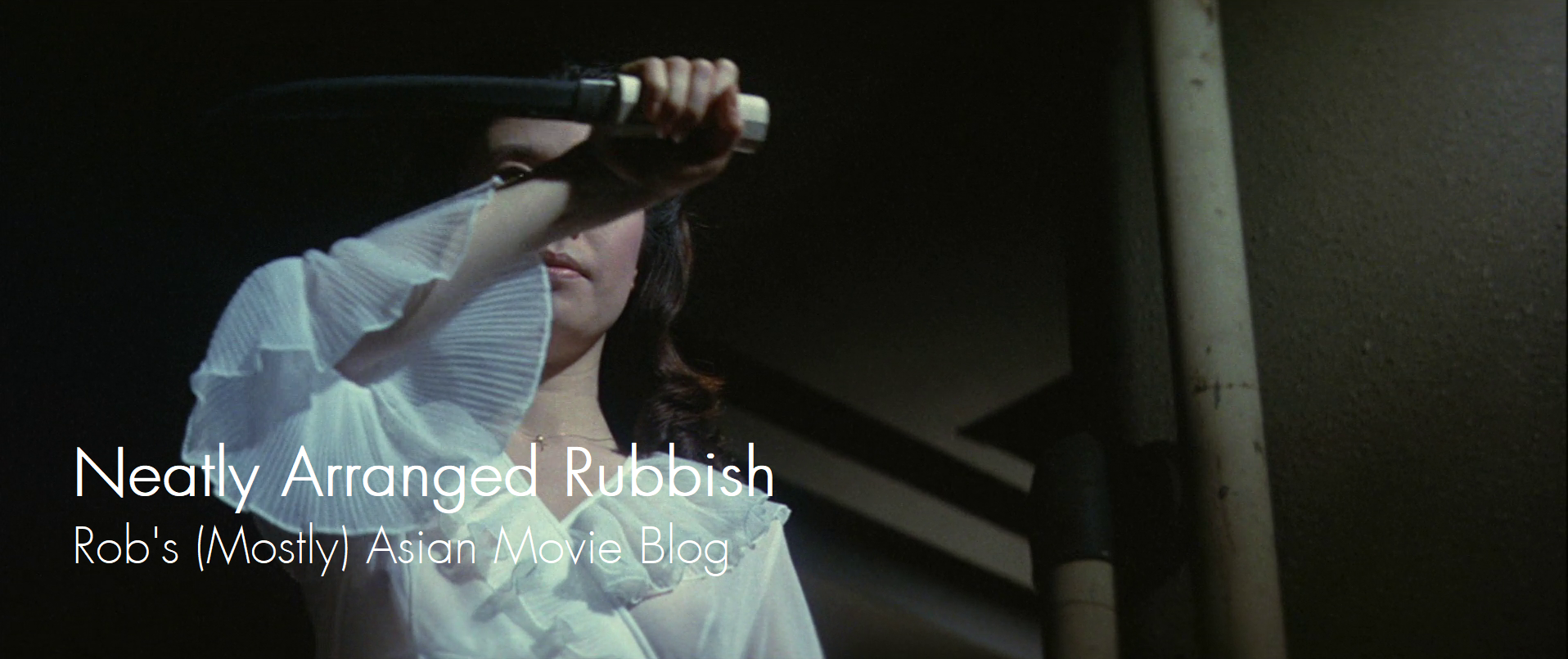
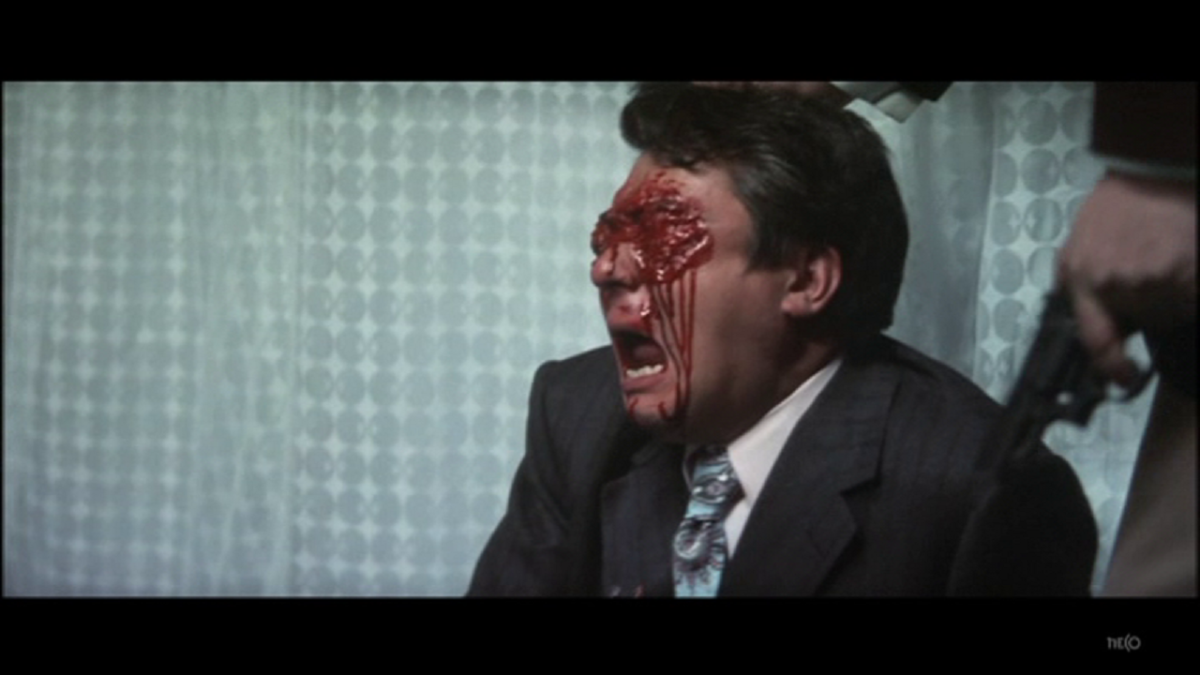
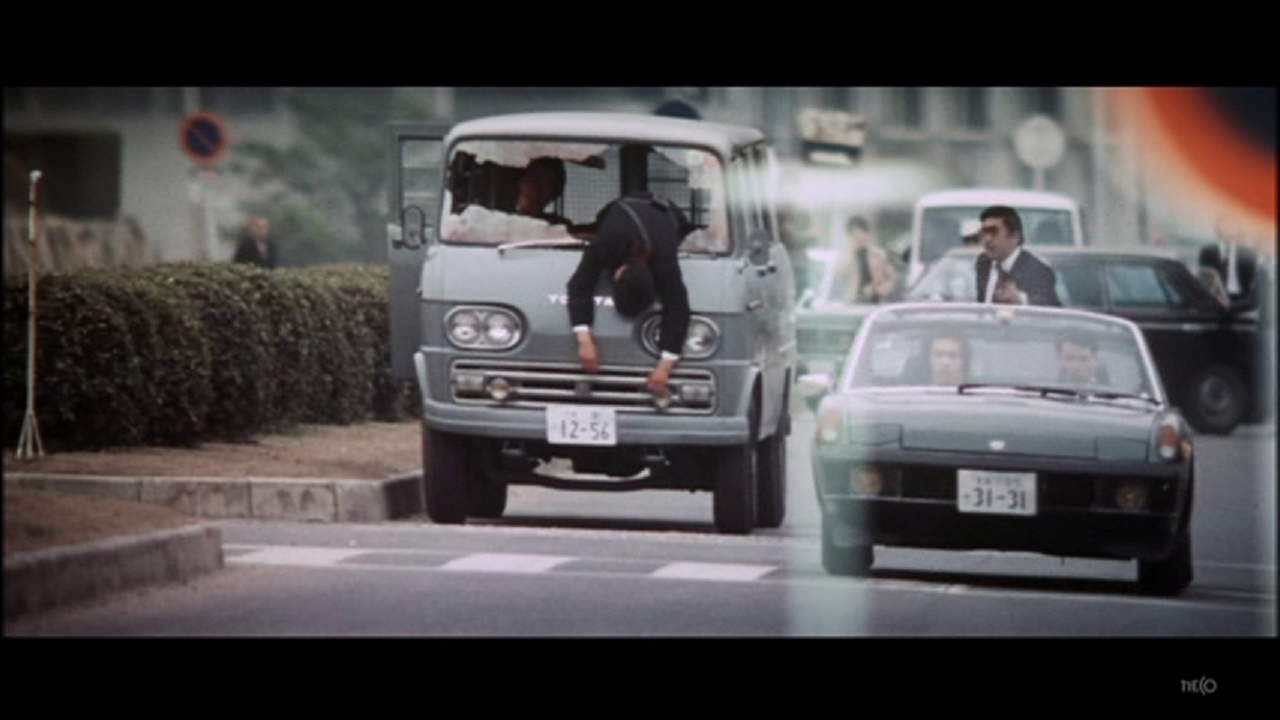
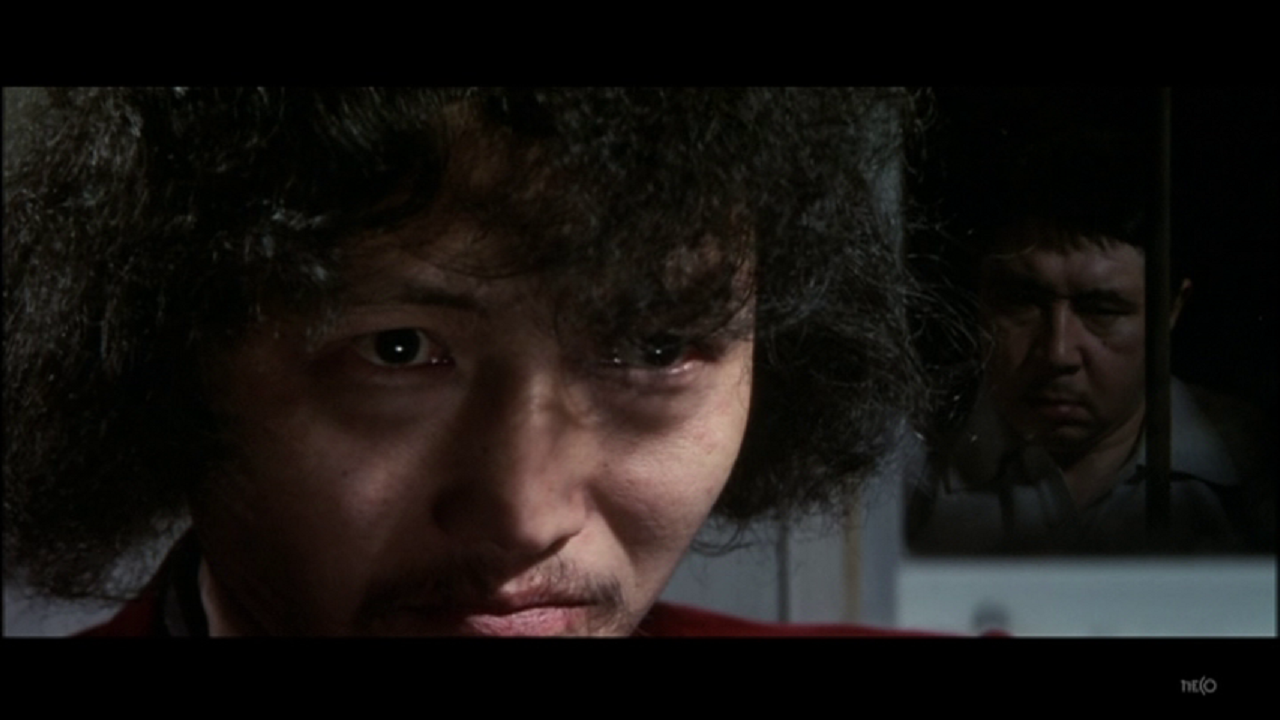
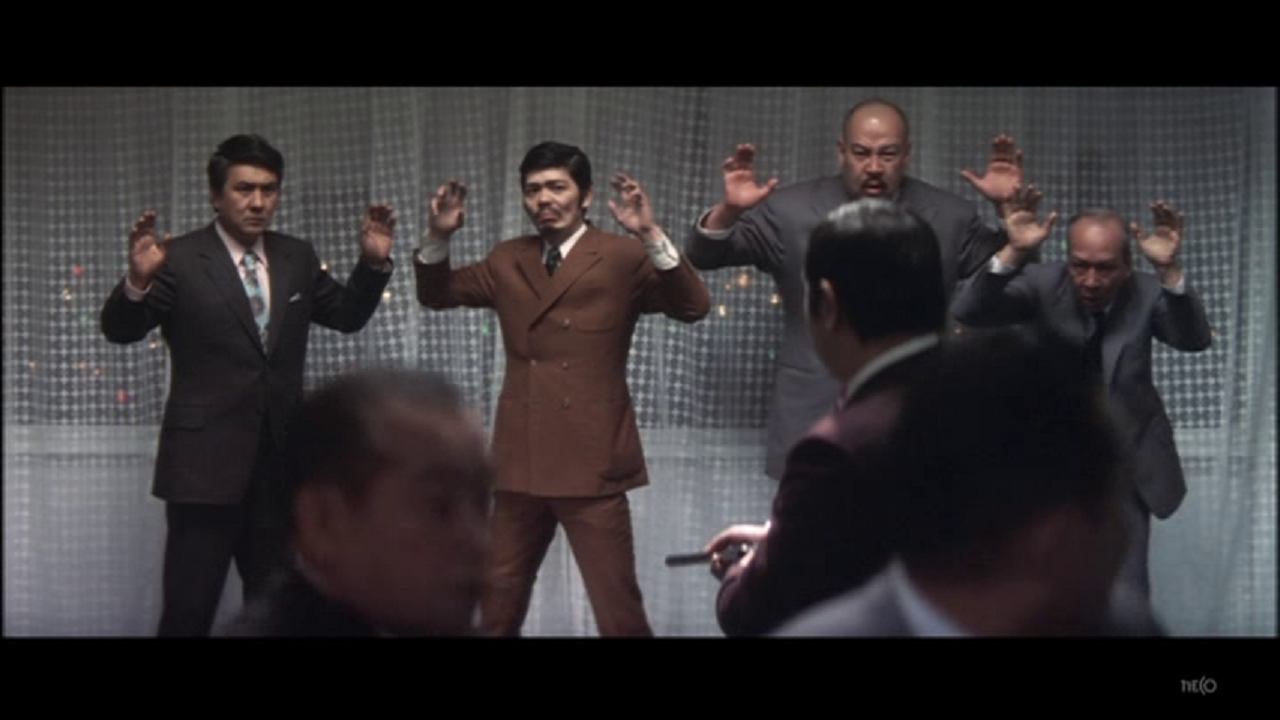
hello thanks for review how did you manage to see this one ?
Hello! Unfortunately I can’t provide you with a direct link (although I believe Internal Sleuth is commercially available on DVD in Japan) but entering the title into the search engine of your choice may well point you in the right direction. Good luck!